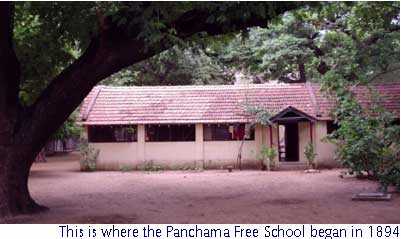For over a 100 years Olcott Memorial High School in Chennai has been giving free education to the poor.
Though it sits on several hundred acres of woodland within Chennai, the Theosophical Society [TS] maintains a low profile. Few people know what theosophy is or what goes on in the vast campus. To its north is the Adyar Creek and on the eastern side, the Bay of Bengal. Towards the south sprawl the vast acres left to nature. Old classical buildings dot the grounds, and silence reigns. Environmentalists are delighted that there is this corner of Chennai that is beyond the pale of development vandals.
For that reason alone it is best not to draw attention to the TS. But its leadership by a quiet and gracious old lady, Radha Burnier, is difficult to ignore. She lives and works almost alone in the century old bungalow that Madame Helena Petrovna Blavatsky lived in. Blavatsky and Henry Steel Olcott founded the TS in 1875. But of direct interest to us here, is the unique free school started by Olcott in 1894, for which Burnier still finds the money and time.
For the forgotten people:
Nineteenth century was possibly India's greatest reformist era; and there was much to reform. British Rule had been seen through for what it was, and nationalist aspirations were rising. Simultaneously, flaws in Indian society were being looked at anew. Ram Mohun Roy, Vivekananda, Aurobindo are some of the many Indian names that come readily to mind from that period.
But there were also several non-Indians, drawn to the east by India. Of them, Henry Steel Olcott, an American, is one of the more extraordinary. In legendary American fashion he was many things rolled into one; he had been a farmer, teacher, soldier, lawyer, writer and of course co-founder of TS.
"Olcott was an educator," says Radha Burnier. "When he looked around, he found the caste-less Indians excluded from all considerations. There may have been mutual barriers among the four castes but they at least had their own spaces in society. Those that were called Panchamas, or 'fifth class', had none whatever. Mission schools did accept them, but what Olcott dreamed of was a service without a religious agenda."
In 1894, in a charming little building that still stands, the first of Olcott's Panchama Free Schools opened its doors to children of toiling, ignored people of Chennai.


